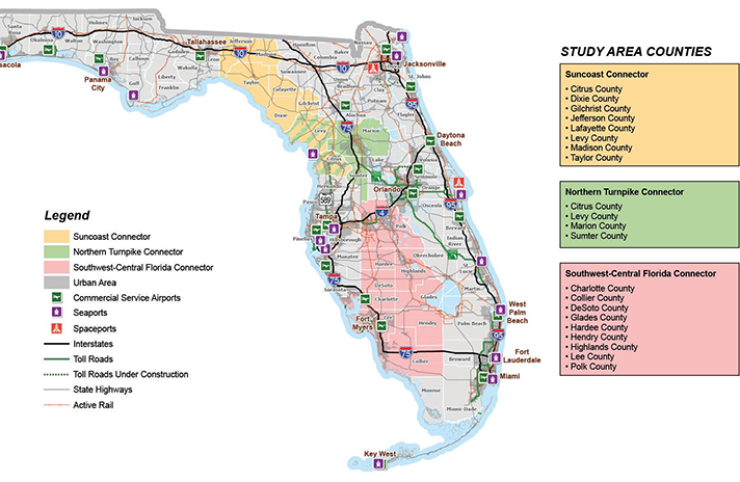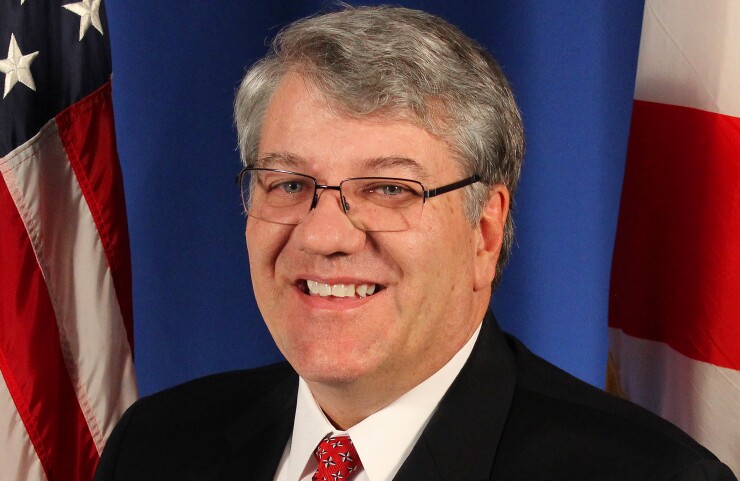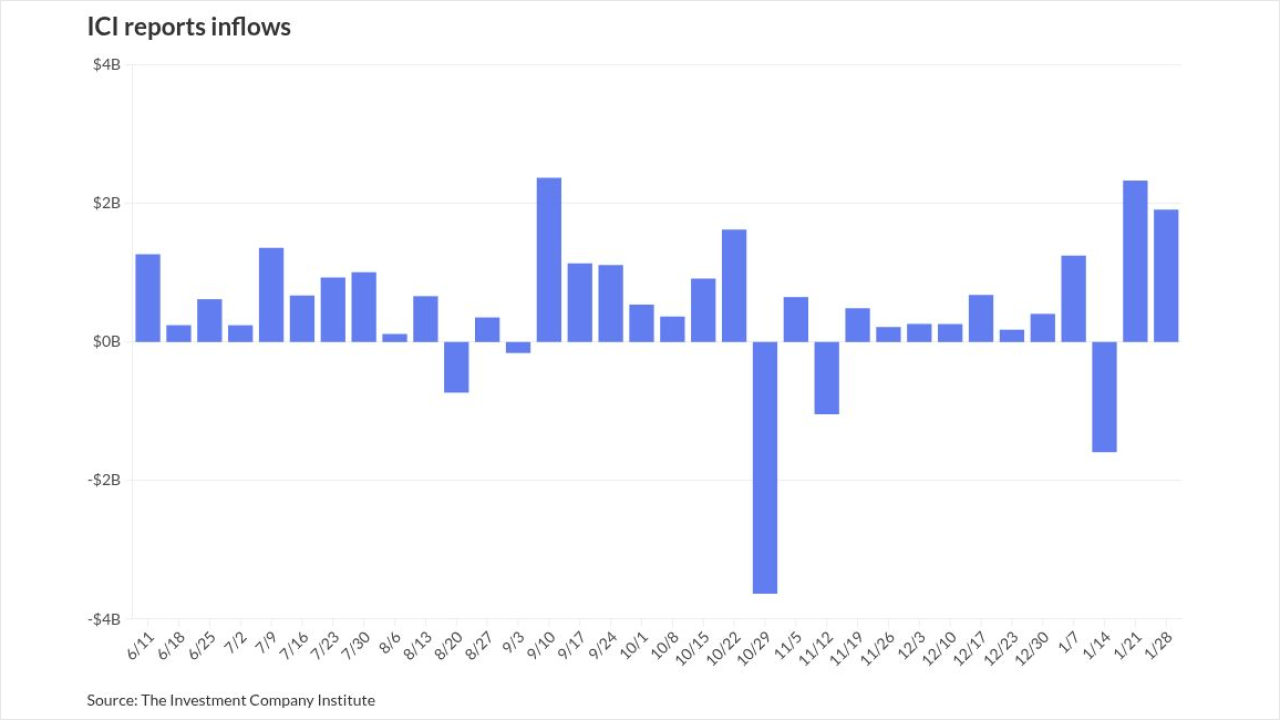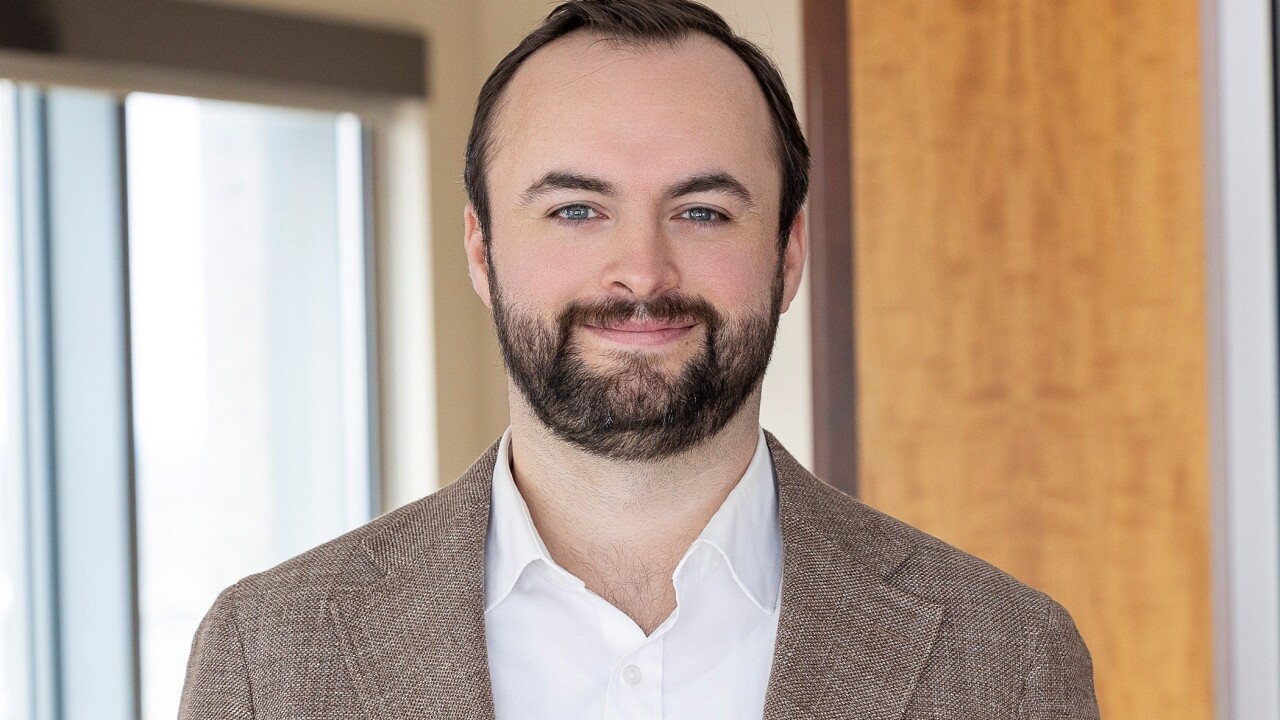Floridians have an opportunity to say what they think about the largest bond-financed toll road program proposed in the state in decades.
Will the feedback matter, though, with a mandate in state law that says "to the maximum extent feasible" road construction must begin by Dec. 31, 2022?

Draft reports for the three proposed toll roads, the
The reports represent the work of three task forces with a combined 127 members that have been meeting since August 2019. Their work, guided by the Florida Department of Transportation, is to implement the toll road program known as the Multi-use Corridors of Regional Economic Significance, or M-CORES.
The M-CORES program was mandated by the Florida Legislature and the governor last year, and requires a task force for each corridor to do the planning necessary to identify the routes of each toll road, planning usually conducted by FDOT as part of its work program.
Combined, the new toll roads would run more than 300 miles and could cost Florida more than $10.3 billion, which doesn't include financing costs, according to a Sept. 16
A separate report called "
State transportation officials, however, have said cost estimates at this time are premature because the exact route of each connector hasn't been determined.
The road program is supported by the Florida Chamber of Commerce and companies in industries that will benefit from them, such as road construction. They contend the program will create jobs and open economic development benefits to rural areas of the state.
Opponents of the roads fear the roads will traverse rural areas, creating sprawl and endangering Florida's protected wildlife. Anti-toll road groups include 55 organizations and businesses that call themselves the "No Roads to Ruin Coalition."
The draft final reports now available for public review represent more than 100 pages of "uncertainty and doubt," the nonprofit Florida Conservation Voters said in an email to members Oct. 2.
“Florida Conservation Voters adamantly opposes the three proposed toll roads and the rushed planning process that has informed the M-CORES task force’s draft final reports,” Lindsay Cross, FCV government relations director, told The Bond Buyer.
“The draft task force reports fail to show a need for the roads and demonstrate that many of the project goals, such as providing broadband and utilities in rural communities, can be accomplished without building toll roads,” she added
FDOT Secretary Kevin Thibault said
"Please keep in mind that, per law, no M-CORES program construction can or will occur if a corridor does not meet financial or environmental feasibility, and these feasibility studies absolutely will be conducted during the next phase," Thibault said.
Thibault also said that "hundreds of new residents and visitors" arrive in Florida daily, especially during the winter, and that growth requires planning to expand the state's road network.
"We must meet the needs of our growing and thriving state," he said, adding that the M-CORES program is designed to plan for enhancing the state's infrastructure.
All three draft final reports say that, "Due to the early stage of planning for this corridor and the limited data and analysis on potential need and impacts available at this time, the task force was not able to fully address its charge of evaluating" the need and impacts for each corridor.
The reports also contained the exact same language saying the task forces "did not reach a conclusion based on the information available at this time that there is a specific need for a completely new greenfield corridor on land through the study area."
"The task force expressed a preference for improvement or expansion of existing major highway corridors or existing major linear utility corridors," the reports said, adding that FDOT should consider a "no build" option in future deliberations until a final recommendation is made about each project.
After the public input period is closed, the reports will be finalized when the Southwest-Central Connector task force meets Oct. 19; the Suncoast Connector task force meets Oct. 20; and when the Northern Turnpike Connector meets Oct. 21.
FDOT will submit the final version of the reports to the governor and the Legislature by Nov. 15.

The M-CORES program was pushed through the 2019 legislative session in Senate Bill 7068 by Senate President Bill Galvano, R-Bradenton, who said the toll roads were needed to serve Florida's fast-growing population.
Galvano also said the routes could be used for hurricane evacuation, to bring infrastructure such as broadband and sewer services to rural areas, and could serve as catalysts for economic development.
Gov. Ron DeSantis signed SB 7068 on May 17, 2019, despite the fact that a needs assessment had not been done on any corridor by FDOT.
Galvano’s legislation redirected general revenue funds and motor vehicle license tax fees to the state transportation trust fund to provide the toll roads with $12.5 million in fiscal 2020; $57.5 million in 2021; $101.7 million in 2022; and $105.9 million in 2023.
While DeSantis cut $1 billion from the fiscal 2021 budget due to expenses related to the coronavirus pandemic, appropriations for the M-CORES program remained intact.
SB 7068 established task forces to study the corridors, and said that the roads can be financed with bonds issued by various agencies, including turnpike revenue bonds, right of way and bridge construction bonds, and the FDOT Financing Corp. The bill also says public-private partnerships can be used.
Cross, with Florida Conservation Voters, said that the draft task force reports validate opponents’ beliefs that more data and meaningful public input is necessary.
“We expect the outcry against the toll roads to only get louder as more Floridians — faced with the impacts of ongoing global health and economic crises — understand this gross misuse of taxpayer dollars,” Cross said, adding that a “no build” option would better protect the state’s water, agriculture, wildlife habitat, and rural quality of life.
Though Thibault, the state's transportation secretary, said Tuesday that no construction will occur on any corridor that isn't financially or environmentally viable, SB 7068 says “to the maximum extent feasible, construction of the projects must begin no later than Dec. 31, 2022.”
The longest toll road being proposed is the Southwest-Central Florida Connector that could slice through the rural heartland of the state about 150 miles from Lakeland to Naples.
The Suncoast Connector would extend the existing 60-mile-long tolled Suncoast Parkway, which runs from Hillsborough County to Citrus County on the west coast and has never met revenue projections, 150 miles north to the Georgia state line.
The Northern Turnpike Connector would be a 40-mile toll road linking the Suncoast Parkway with the Florida Turnpike, near Interstate 75.
It’s not clear when the work of the task forces will conclude.





